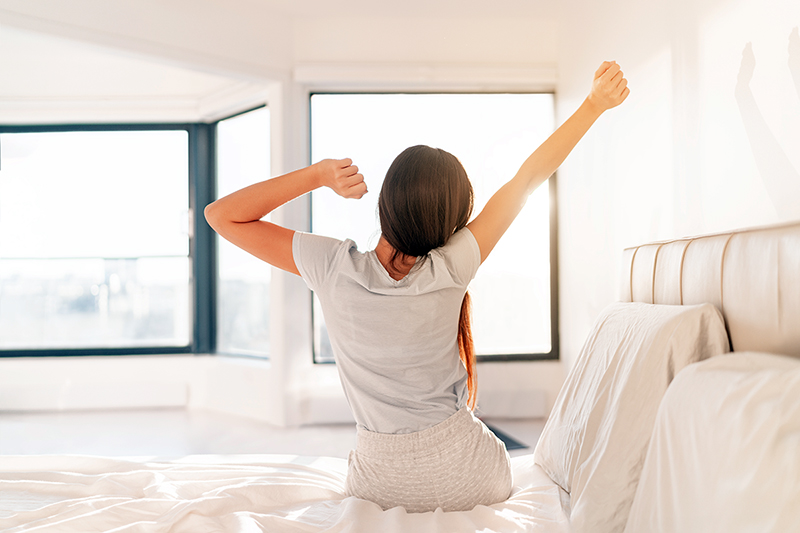How to Reset Your Sleep Schedule for Success
Many people struggle with getting adequate sleep. These seven tips can help you catch some serious ZZZs.

It is recommended that adults should be getting between seven and nine hours of sleep per night.
When you have trouble getting enough quality sleep, your health and lifestyle are negatively impacted. Sleep deprivation leads you down the road to a variety of health problems like
• Memory issues or trouble concentrating
• Mood changes
• Weakened immunity
• Gaining weight and having digestive complications
• Increased paranoia, anxiety, or other mental illnesses
• Trouble focusing, leading to accidents and injuries
Sleep is important for your body, and there are great benefits from getting a more restful sleep.
Related: What’s Really Keeping You Up at Night
Resetting your sleep clock effectively takes time, but it’s not impossible to do. However, jumping straight into a new sleeping pattern rarely lasts unless you make small adjustments first.
Here are seven tips to help reset your internal sleep clock, so you can sleep at night and improve your sleep habits.
Make small changes to improve your sleep
Whether you’re traveling to a new time zone, adjusting to a new work schedule, or needing to re-establish your sleep schedule, it’s best to take baby steps toward your new pattern. Start by adjusting your current sleep schedule by small increments of time, and let your body adjust until you continue altering your schedule.
For example, set your alarm for 15 minutes earlier than normal. Continue waking up at that time for a few days. As your body adjusts to waking up earlier, you can set your alarm for another 15 minutes.
If gradual changes aren’t helping you adjust to a new sleep schedule, consider talking with your doctor for other helpful solutions.
Keep the same sleep schedule every day
Going to bed and waking up at the same time every day of the week is actually good for your heart and lowers your risk of developing other diseases. Even on the weekends, wake up at the same time. Sleeping in on the weekends can throw off your internal sleep clock, and you can find yourself not able to fall asleep the next night.
A better approach to gaining a few extra hours of sleep is to schedule a quick 20- to 30-minute nap during the afternoon. Shorter naps will help you avoid the groggy feeling you sometimes feel when you sleep too long.
Use natural light to reset your circadian rhythm
When you wake up, get as much natural light as you can. Exposure to sunlight aids your circadian rhythm, helping you wake up. Also, spending time outside actually helps your body restore its natural sleep cycles.
Reduce stimulants before sleeping
It’s challenging for your brain to power down for sleep when you’re glued to screens and phones that have bright lights. Keep your screen time as minimal as possible at least two to three hours before bed. The goal is to reduce exposure to blue light found in phone screens and other monitors when it is close to bedtime.
Use your bedroom only for sleeping
Your bedroom’s main purpose should be sleeping. Put away all electronics to make sure you can get a good night’s rest. It’s also important to keep your sleeping environment cool and dark while sleeping. Throughout the day, your body’s internal temperature changes and cools down throughout the night.
Keeping your bedroom cool—around 65°F—allows your body to settle down for a good night’s rest. Otherwise, in a cooler or hotter room, your body will have difficulty naturally adjusting as it normally does and can result in disrupted sleep.
If you use your bedroom for anything other than catching necessary REM cycles, make changes so your bedroom can be a welcoming space that’s specifically made for helping you fall and stay asleep.
Related: Sleep Habits: What Does the Way You Sleep Say About You?
Do calming activities before sleeping
If you’re not ready to sleep when it’s time, don’t spend the time worrying or trying to force yourself to sleep. Instead, try reading a book, taking a hot bath, or journaling.
These activities will ensure you’re ready to get the sleep you need. If you are still not able to fall asleep, consider adjusting your pre-bedtime routine.
Avoid caffeinated beverages and foods closer to bedtime
Caffeine acts as a stimulant by reducing sleep-inducing chemicals in the brain. It can result in the feeling of alertness that can last for roughly five hours and can be felt as quickly as 15 minutes after consuming.
While it can help you feel more awake during the day, pay attention to when you have caffeine and do you best to avoid caffeinated products several hours before bedtime.






